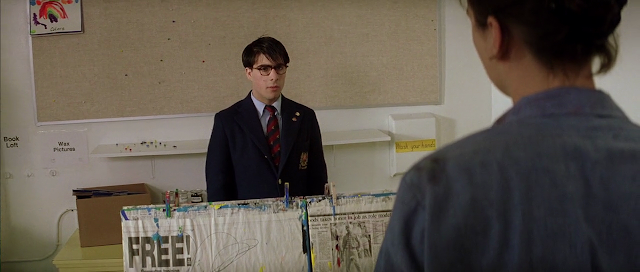Shortly after Max Fischer (Jason Schwartzman) gets kicked out of Rushmore, Ms.Cross (Olivia Williams) resigns from teaching at Rushmore. In this scene, Max's delusions of having a romantic relationship with Ms.Cross are shattered when she makes it clear that she has no interest and mocks Max's intentions.
I chose this scene because its shots are different from Wes Anderson's style which he uses in all his feature films and is often parodied for (notably in this SNL Halloween Special). Despite its deviation, this scene still stays very true to Anderson's style, and a small "wash your hands" sign is evidence for that which I will get into later. But first, it is important to be familiar with how Anderson typically stages his shots.
A vast majority of Anderson's shots throughout his films are head-on or profile. To some, this approach of shooting is off-putting and even downright unsettling. However, this approach does a few things for Anderson:
- It is an homage to classical theater, even down to having a play within a film as seen in Rushmore and Moonrise Kingdom (2012). (fig.1)
- It helps give an artificial feel to Anderson's stories, where the delusions of characters are a central flaw and source of conflict. (fig.2)
- It helps the audience understand the relation of setting to the character(s).
(fig.1) Plays within films, as seen in Rushmore and Moonrise Kingdom
(fig.2) Captain Zissou in The Life Aquatic (2004) tries to fabricate a life full of adventure and drama through his documentaries. Anderson does not hide the fact that much of Zissou's boat is a film set.
In this Rushmore scene, the camera is hand-held for all shots here, as opposed to Anderson's usual profile/head-on with cameras mounted on dollies and cranes. I also realized that this method of shooting is used by Anderson when the delusions of a character are broken, sometimes during a chaotic event that forces a character out of their comfort zone. (fig.3)
(fig.3) Death and loss provide a sobering realization for Anderson's characters, notably in Life Aquatic and The Darjeeling Limited (2007)
However, Anderson does not break from his style completely in this Rushmore scene. He is still very deliberate in how the shots are composed and uses the space for the sake of narrative as a play director would. The way Cross uses the easel as a barrier and how Max gets talked into a corner is classic theater (fig.4,5), while the words "wash your hands" and "free" on Cross' shoulder at start and finish is no coincidence and reflect Cross' state of mind (fig.4,6); a testament to Anderson's meticulous style.
(fig.4) Above Cross' shoulder is a "wash your hands" sign. While not out of place in this classroom setting, it subtly reflects her state of mind. It is an old expression of one ridding themselves of responsibility for someone else's life. One of the most notable uses is in the Bible, where Pilate sends Jesus to the crowd to be judged and executed (Matthew 27:24)
(fig.5) Max gets backed into a corner. While there is space outside, he is still trapped. This backdrop with all the fish tanks is a reference to the aquarium Max tried to build for Ms.Cross in an effort to win her over but got him expelled. It is a visual play on the mess he got himself into.
(fig.6) With Max gone, Cross is free. Is the word over her shoulder there by coincidence? I hardly think so.
As seen with Anderson's deliberate use with of themes in licensed soundtracks for his films, such as betrayal in Rushmore with "Oh Yoko" by John Lennon, nostalgia in The Fantastic Mr.Fox with "Balled of Davy Crockett" and "Love" which were Disney movie originals, and a sense of absolute uncertainty in the opening of The Darjeeling Limited with "This Time Tomorrow" by The Kinks, Anderson has a blunt yet subtle way with the presentation of words in his films, scattered throughout like Easter Eggs.







No comments:
Post a Comment